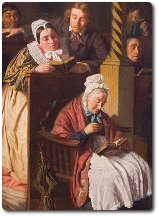Articles
- Poetry: Recognising poetic form
- Historical aspects
- Stylistic aspects
Hymn
Definition
A hymn is a lyric poem or sacred song which is written in praise to a deity or spirit. It is sometimes addressed to an ideal, such as beauty or truth.
Origins
While there are examples of hymns as far back as ancient Egypt, the hymn as we know it in Western literature originated in Greece with the Homeric Hymns. These were a collection of hymns dedicated to various gods from Greek mythology. The Homeric Hymns get their name, not because they were written by Homer, but because they share the same poetic metre (dactylic hexameter) as Homer's Iliad and Odyssey.
Inspiration
The Greek hymns provided inspiration for seventeenth and eighteenth century poets like Johnson, Fletcher, Gray and Keats to write hymns to Greek deities. Shelley was clearly familiar with the Greek hymn, having translated several Homeric Hymns. This is apparent in his Hymn to Intellectual Beauty, in which he addresses the Spirit of Beauty. However, the bulk of hymns found in English literature have Christian themes.
Development of the congregational hymn
By the seventeenth century, the Christian church no longer restricted  corporate worship to the Psalms of David, canticles, and Latin hymns based on the Bible. The content of hymns widened beyond direct quotations or paraphrases of scripture to include the ordinary believer's religious experience.
corporate worship to the Psalms of David, canticles, and Latin hymns based on the Bible. The content of hymns widened beyond direct quotations or paraphrases of scripture to include the ordinary believer's religious experience.
The Metaphysical poets were the first major group of English poets to make use of the hymn as devotional poetry. However, the subsequent use of these hymns in congregational worship was not widespread until the eighteenth century, and hastened the publication of hymnals, the best known of which is Hymns Ancient and Modern, first published in 1861.
Isaac Watts, John Wesley and John Newton are among the most well-known hymn writers, but the selection includes hymns by poets such as:
- William Blake (And did those feet in ancient time)
- George Herbert (Let all the world in every corner sing)
- John Milton (Let us with a gladsome mind)
- Christina Rossetti (In the bleak mid-winter).
Real poetry?
Some have regarded the congregational hymn as a lesser form of poetry, with too many restraints on language, expression and poetic device. The discipline of musical accompaniment and theological content necessitated the following characteristics:
- Typically four, six, or eight line stanzas, frequently in iambic metre
- Rhyming couplets (aabb), or cross-rhymes (abab)
- Devotional themes
- Simple rhetoric
- Vernacular language
- Simple imagery.
Proponents of the hymn as poetry argued that it was the only poetry that the common man or woman had access to, and its use allowed the ordinary person to articulate their feelings about God in a way that often moved them deeply, and was a critical component in their expression of faith.
Essentially the hymn book of the Jerusalem temple, expressing the whole range of human emotion, from dark depression to exuberant joy; many attributed to David.
Big ideas: Psalms
Recently Viewed
-
Origins and development of hymns
now -
A-Z: Literary titles from the Bible » A hymn to Christ
12 minutes ago -
The White Devil » More on the Christian perspective on poverty
15 minutes ago -
John Keats, selected poems » Isabella: or The Pot of Basil: Imagery, symbolism and themes
22 minutes ago -
Metaphysical poets, selected poems » What if this present
55 minutes ago -
Metaphysical poets, selected poems » The Anniversarie
55 minutes ago -
The Taming of the Shrew »
55 minutes ago -
A-Z: Books of the Bible » Jeremiah
1 hour ago -
Arthur Hugh Clough's The Latest Decalogue - intertextuality audio visual resource
1 hour ago -
The White Devil » Christian values
1 hour ago -
King Lear » Act 1, scene 4
1 hour ago -
Wide Sargasso Sea » Part one, section 2
1 hour ago -
John Keats, selected poems » Religious expression
2 hours ago
